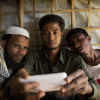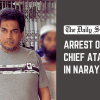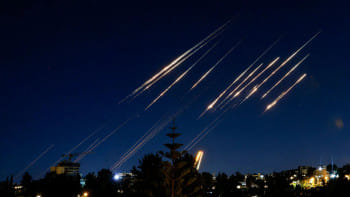Reporter’s Diary: Massacre, every day
As I was heading towards Shah Porir Dwip, the uninterrupted range of lush green mountains had an entrancing effect. Momentarily, I forgot my purpose for visiting. As I was marveling at the clouds delicately clinging to the mountains, like lovers reuniting after a long time, I realised, not all the wisps were clouds; some were smoke, billowing from villages on the Myanmar side, clearly on fire.
On the roadside, I could see Rohingyas staring at the columns of smoke in the distance. Someone had set their homes alight; everything they had known and loved was going up in flames. Now, they were witnessing the loss of their homes with their feet planted on a land strange to them. I wondered if the mountains themselves, protecting Naypyidaw from the disapproving of glare of the world, knew whether they were Rohingyas or not.
Soon we reached Shahpori Dwip, the point where Bangladesh ends and the land of genocide begins. The first thing that hits you there is the long lines of people pouring in. The second thing that shocks you is the silence. Heads bent low, the procession of pain, formed fresh off the boat, trudge along with nary a word spoken.
We often feel that we can talk our way out of things. These people had tried. They had failed. They had pleaded. They had failed. Words had failed them. Why should they give them another chance?
Searching the crowds for someone to talk to, all I see are eyes staring back; each eye is silently questioning my very conscience. It feels like they are poring deep into your soul, threatening to bare everything you hold inside as a cost for what they have been put through. Suddenly, I find a young girl in her father's arms. As our eyes meet, a shy smile touches the corners of her lips. Her hair is golden, unexpected given where we are.
"Her name is Reshmi," her father, Abdullah, says, informing us that she is four. Reshmi escaped with her parents yesterday. "They burned our house. They were slaughtering people in front of us. We began to run," he says. Even in these trying times, I feel a sense of happiness. They had all made it. Except, any happiness you feel here comes from a lack of knowing. "My 5-year old son couldn't make it. I saw him get shot. He died in front of me," Abdullah adds. The words send a chill through my bones. A father seeing his son murdered in cold blood.
I go up to Reshmi's mother, Sabekun Nur, and ask her what she dreams for her daughter now. Draped in a burqa, only her eyes are visible. "What dreams? My son is dead," she adds with finality. I can say nothing more to her. Abdullah interjects saying he wants to send Reshmi to school. His son, Syedullah, loved school.
He then tells me he has to leave. Before I look for someone else to talk to, 35-year-old Azizul, from Rashidong approaches. His Bangla is pretty good, so our conversation is not difficult. "I came here with my four kids and wife. I was a madrasa teacher there," he says. The family has been surviving on dates and water for the last six days. As he becomes increasingly restless, I ask him about Al-Yaqin and he says he has never seen them.
I begin to walk towards where the boats are docking. Shahanaz, a girl in a pink kameez crosses my path, tears streaming down her face. She seems alone. I ask her where everyone is. "My mother is dead. They killed her," she says, before running away. While no one speaks here, sudden cries interrupt the silence now and then. Now, it comes from Zahida Begum, 13, a resident of Rashidong, who has come here with her 10 brothers. I am almost afraid to ask her what's wrong. She sees me and sniffles. "They took my father," she cries out when I ask.
After a few minutes' walk I see two men carrying a woman, each of her arms around their shoulders. Meet 85 year old Sokina. Another resident of Rashidong, she has travelled seven days. She is being carried by her son Lal Miah and his son, Ziaul Haque. I ask her how she is. "What will I say? I have lost three sons. They were all shot."
Before I can depart, a horrible sight greets me. A woman, drags herself across the rocky shoreline. Her two children watching her from a distance are delighted. This is Nur Nahar. Her leg was burnt when the military launched grenades. The eight months pregnant woman can walk no longer. "We were in the hills for days," she says. "The military threw us in to the river. Told us to swim across or die."
Today Myanmar's government talks about eliminating terrorists. I look at her children and anger overcomes everything. Myanmar is lying. A massacre is taking place in Myanmar every day. It cannot go unpunished.

 For all latest news, follow The Daily Star's Google News channel.
For all latest news, follow The Daily Star's Google News channel. 








Comments